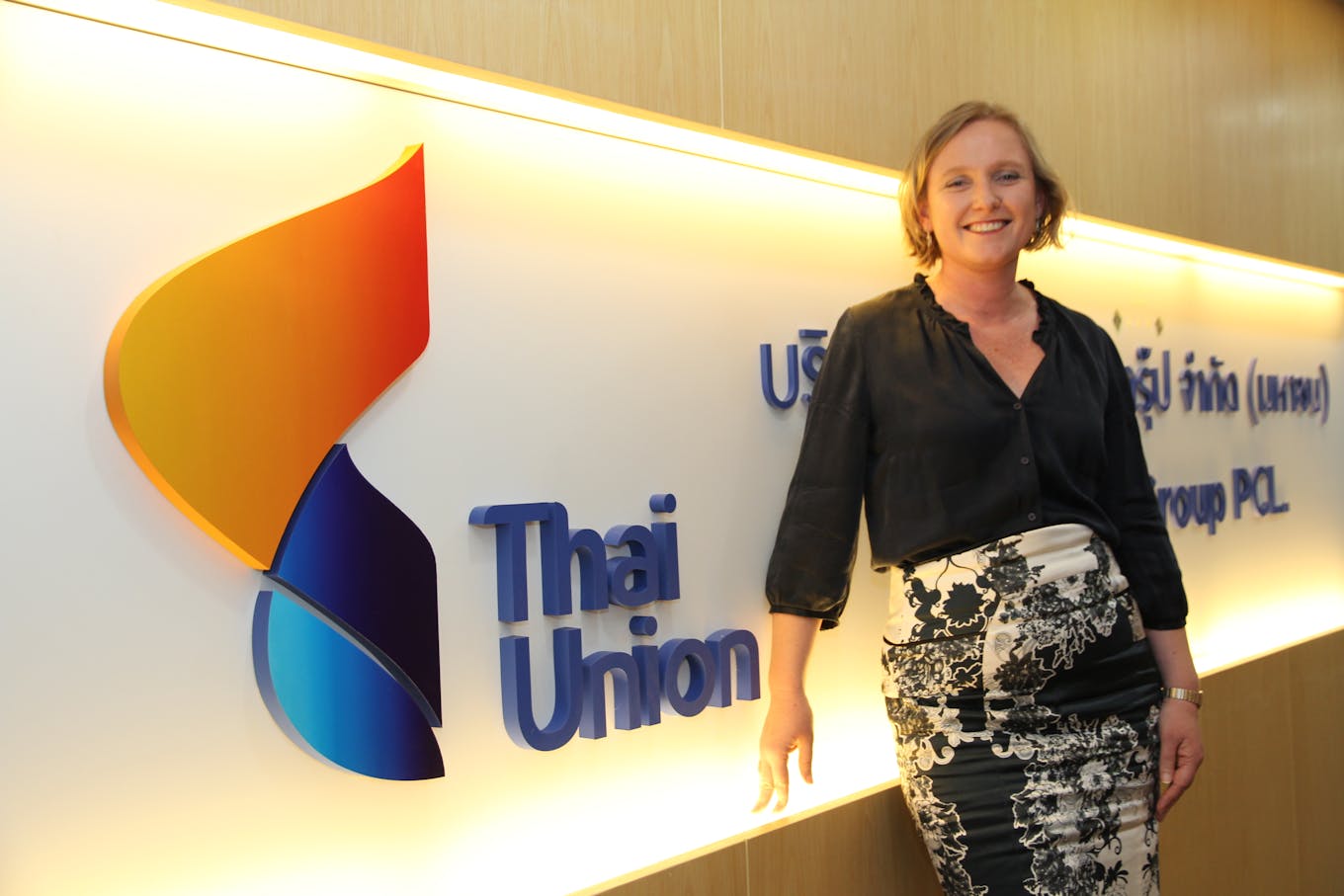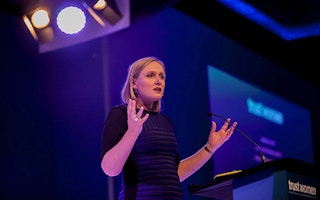Darian McBain’s love for supply chains started when she was working in the United Kingdom’s National Health Service (NHS), the biggest purchasing and supply chain organisation in Europe, some might argue in the world.
To continue reading, subscribe to Eco‑Business.
There's something for everyone. We offer a range of subscription plans.
- Access our stories and receive our Insights Weekly newsletter with the free EB Member plan.
- Unlock unlimited access to our content and archive with EB Circle.
- Publish your content with EB Premium.
Since then, she has worked in different areas, from palm oil to timber and now seafood. Her latest role as the executive advisor of sustainability and safety, health and environment at the world’s largest seafood processor, Thai Union Group, is more crucial now than ever with the ongoing pandemic.
“Supply chains are fascinating in that they almost seem to have a life of their own. Once you start looking into the supply chain of any consumer good, you see how far the product has travelled and how many hands it has passed through,” said McBain.
To increase sustainability, organisations need to understand the full picture—the many human and environmental stories in each supply chain—and use their influence to drive better outcomes, she added.
“
Climate change is a wicked problem. It hasn’t been so easy. So maintain your passion and assume that you’re in for the long haul.
When McBain joined Thai Union in 2015, the seafood giant was under fire for illegal fishing practices and forced labour. But under her leadership, she introduced policies on the ethical recruiment of migrant workers and signed a landmark agreement with Greenpeace in 2017 to tackle illegal fishing and worker rights.
While Thai Union is now top-ranked on several sustainability indices like the World Benchmarking Alliance’s Seafood Stewardship Index and the Dow Jones Sustainability Index for food products, the conglomerate has more work to do to fully meet its suite of environmental and human rights commitment, Greenpeace said in a statement released earlier this year.
In this interview with Eco-Business, McBain talks about her career, the next steps for the seafood industry, and the new challenges that have arisen from the pandemic.
What’s your education background?
I studied a Bachelor of Environmental Engineering at the University of New South Wales, and we were the first intake for that degree. So it was really at the very start of environmental engineering. And it was, interestingly, the first engineering degree in Australia to ever have above 50 per cent of females registered to start the degree.
It felt like the start of a big change going on in the world. And then I did a Master’s of Science in business strategy, politics and environment at Birkbeck University in London. And then I did my PhD on human rights, impacts and environmental impacts in global supply chains at the University of Sydney.
What’s your proudest career moment to date?

McBain at the Thai Union office in Bangkok, Thailand. Image: Thai Union
I’ve received a few awards which I’m very proud of. Recently I was named one of Fast Company’s most creative people in business for 2020. I was the Edie Sustainability Leader of the year, and the Ethical Corporation Responsible Leader of the year.
The work that I’m proudest of is aligning the seafood industry with sustainability. When I started working at Thai Union, corporations didn’t get involved in fishery improvement projects. Through working with large multi-stakeholder processes that include suppliers and non-profit groups, the industry has evolved and changed over the past five years.
I’m also proud of the work that I’ve done around worker rights, particularly to do with ethical recruitment, because it has an impact on people’s lives directly.
What motivates you?
I take a very engineering approach. I like to have a challenge, and then find the solutions that will bring about real change on the ground or water. I want to see that a project is mapped out and that it’s complete, I don’t work at my best if I’m just looking at policies or theories.
It’s a combination of being able to think creatively and being able to work with other inspiring people to ultimately create some real change.
Were there instances in which the solutions that you implemented didn’t lead to the outcome that you expected?
When we looked at the fishing vessels in Thai Union’s supply chain, we wanted to improve the regulation of fisheries, to make sure that catch wasn’t illegal, unregulated and unreported (IUU).
Our idea was to use electronic catch documentation to record all fishing activity and transfer the information back to land using satellite data. During the process, we thought to also connect fishers on the vessels back to their loved ones on land using an app called FishTalk. Connectivity is important when they’re out at sea for many weeks at a time.
In the end, the transfer of fish information to the regulators didn’t really work because the regulators weren’t ready to receive information electronically. The thing that was most successful was the afterthought, which was connecting workers with their loved ones. It was an unexpected but really heartening outcome.
What are some areas of improvement or next steps for the seafood industry?
I think the next revolution will come with greater transparency—understanding what’s happening on water, whether it’s fish or plastics, but also on land. In particular, understanding how we can improve the lives of workers in the supply chain. I hope that we’ll have some technological solutions that will help us in that journey.
How has Covid-19 affected your work?
I took over the management of Thai Union’s Safety, Health and Environment function at the start of 2019 and it was difficult to gain traction at first. I know that it takes a while to change culture. But Covid-19 has thrown into focus that we need people who are safe and healthy in their work environment, I hope this will help us make progress faster.
For Thai Union, Covid-19 has had a big impact on our supply chains. If we look at the vessels, all seafarers have had an extremely difficult time over the past few months because they haven’t been able to leave their vessels at the end of their tour.
Whether that’s in transportation or in fisheries, they haven’t been able to have new crews change onto the vessels. Covid-19 has raised new challenges that we need to think about in terms of safety for people who are at sea.
What’s the best piece of advice you could give someone starting out in sustainability?
If you have the opportunity, work on a topic that you’re passionate about. If you’re passionate about a topic, you’re always driven to do more. And it doesn’t necessarily seem like work because it’s what you’re interested in.
Keep an eye on where you want to get to and what’s the future that you’re trying to create. I think for sustainability professionals, this is an important question to be asking.
What’s the one thing you wish you knew before you started out in sustainability?
The sustainability field has completely evolved since I started out. We were the first intake of environmental engineers in Australia and we had great optimism that we were going to change the world.
I thought we would have the problem easily sorted out within five to 10 years. But of course, climate change is a wicked problem. It hasn’t been so easy. So maintain your passion and assume that you’re in for the long haul.














